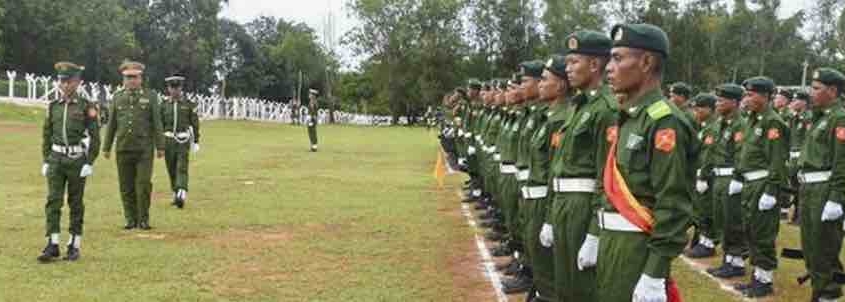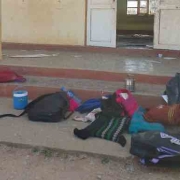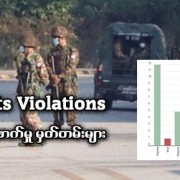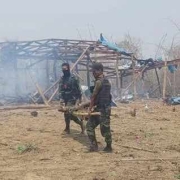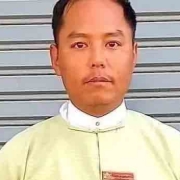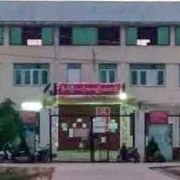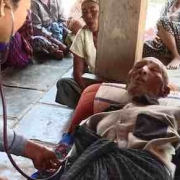Junta deploys first round of military recruits to Myanmar’s frontlines
The new soldiers are headed to brutal conflict zones after only 3 months of training.
The first round of soldiers recruited under Myanmar’s controversial military draft law have completed their training and are being deployed to the frontlines of the junta’s war against rebels in the country’s remote border areas, their family members said Tuesday.
The deployment marked the latest chapter in the junta’s bid to shore up its forces amid heavy losses against various ethnic armies and rebel militias since its 2021 coup d’etat, prompting the junta to enact the People’s Military Service Law in February.
Under the law, men between the ages of 18 and 35 and women between 18 and 27 can be drafted to serve in the armed forces for two years.
The announcement triggered a wave of assassinations of administrators enforcing the law and drove thousands of draft-dodgers into rebel-controlled territory and abroad.
The military carried out two rounds of conscriptions in April and May, training about 9,000 new recruits in total. A third round of conscription began in late May, with draftees sent to their respective training depots by June 22.
The first batch of recruits completed their three-month training on June 28, and family members told RFA Burmese on Tuesday that the new soldiers were sent to conflict zones in Myanmar’s Rakhine and Kayin states, and Sagaing region, beginning in early July.
While the junta has never said how many recruits were trained in the first group, a mid-April report by the Burmese Affairs and Conflict Study, a group monitoring junta war crimes, indicated that it was nearly 5,000 young people from across the country.
RELATED STORIES
Thailand, Myanmar sign agreement on extradition of criminal suspects
Junta military preparations point to brutal next phase in Myanmar conflict
Dozens of officials carrying out Myanmar’s draft have been killed
“My husband told me that orders from [the junta capital] Naypyidaw directed the deployment of new recruits from training batch No. 1 to conflict-affected areas, including Rakhine state,” said Nwe Nyein, the wife of a new recruit from Ayeyarwady region.
“They [the junta] had previously said that new recruits under the People’s Military Service Law would not be deployed to the frontlines,” she said. “However, I am worried because my husband was sent to the remote border areas.”
Nwe Nyein said that the second batch of recruits are expected to complete their military training on Aug. 2 and reports suggest that they will also be sent to the frontlines.
Used as ‘human shields’
A resident of Myanmar’s largest city Yangon, who requested anonymity for security reasons, said that some people close to him had been injured in battles in northern Shan state and have since returned home.
“A young man from our town was shot in the arm, but he never underwent an operation to remove the bullet,” the resident said. “He also said that almost all the new recruits sent to the frontlines had been killed, and their families didn’t even receive their salaries.”

In southern Myanmar’s Tanintharyi region, residents told RFA that the junta is deploying new recruits to battle.
Min Lwin Oo, a leading committee member of the Democracy Movement Strike Committee-Dawei, condemned the deployment of new recruits with only short-term military training, suggesting that they are being used as “human shields.”
Flagging morale
Former Captain Kaung Thu Win, who is now a member of the nationwide Civilian Disobedience Movement of former civil servants that left their jobs in protest of the military’s power grab, told RFA that the junta urgently needs more soldiers, and he expects that nearly all new recruits will be sent to the frontlines.
“About 90% of these new forces will be dispatched to the battlegrounds, regardless of whether they engage in combat [with rebel groups] or target people [civilians],” he said. “Their [the junta’s] main objective is to ensure they have more soldiers equipped with guns.”
Kaung Thu Win also said that the junta faces many challenges in its propaganda efforts to persuade new recruits to fight, but is also increasingly unable to trust its veteran soldiers as losses mount.

Than Soe Naing, a political commentator, slammed the junta over the reported deployment and echoed the former captain’s assessment of the military’s low morale.
“Young people are being sent to die after … [mere] months of military training,” he said. “Even veteran soldiers in their 60s who have been sent to the battlefield have lost their motivation.”
5 years of service?
The junta has yet to release any information about the deployment of new recruits to the frontlines.
Meanwhile, although the People’s Military Service Law states that new recruits must serve for a total of two years, reports have emerged that the junta is telling soldiers that they will have to fight for five.
Junta officials have publicly denied the reports.
Attempts by RFA to contact the office of the chairman of the Central Body for Summoning People’s Military Servants in Naypyidaw for further clarification went unanswered Tuesday.
Translated by Aung Naing. Edited by Joshua Lipes and Malcolm Foster.

